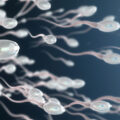Last updated on March 25, 2025
Water is essential for nearly every function in the human body, from regulating temperature to supporting digestion and circulation. While hydration is often associated with energy levels, skin health and kidney function, it also plays a crucial role in male reproductive health.
One common question is: Does drinking water increase semen production? While multiple factors influence semen volume and sperm health, hydration is a key element in supporting optimal function. This blog explores how water intake affects semen production, why hydration matters for male fertility and how to maintain a healthy fluid balance.
Understanding Semen Production and Male Fertility
Semen is a fluid that carries sperm, providing nutrients and a protective environment for their movement. The body produces semen through the prostate gland, seminal vesicles and testicles, combining fluids that contribute to its volume and consistency.
Key factors that influence semen production include:
- Hydration levels – Water is a major component of semen. Dehydration can affect semen volume and thickness.
- Hormonal balance – Testosterone and other hormones regulate sperm production.
- Diet and nutrition – Certain vitamins and minerals, such as zinc and vitamin C, support sperm health.
- Lifestyle choices – Smoking, excessive alcohol consumption and stress can negatively impact fertility.
Maintaining good hydration is one of the simplest and most effective ways to support overall reproductive health.
The Link Between Water Intake and Semen Production
1. Hydration Supports Semen Volume
Since semen is primarily composed of water, fluid intake directly impacts its production. Drinking enough water helps maintain normal semen volume, ensuring that sperm are well-supported within the fluid. If the body is dehydrated, it prioritises water for essential organs like the brain and heart, which can result in reduced semen production. This may lead to thicker, less mobile sperm, potentially affecting fertility.
2. Water Improves Sperm Motility and Health
Sperm motility (how well sperm move) is a key factor in male fertility. Proper hydration keeps semen at the right consistency, allowing sperm to move efficiently. Dehydration can make semen more viscous, which may hinder sperm movement. Hydration also supports blood circulation to the reproductive organs, ensuring that the testes receive sufficient nutrients and oxygen to produce healthy sperm.
3. Prevents Semen Abnormalities Linked to Dehydration
When hydration levels drop, the body’s ability to regulate pH balance and electrolyte levels is affected. This can alter the consistency of semen and even affect sperm morphology (shape and structure). Poor hydration has also been linked to increased oxidative stress, which can damage sperm DNA and reduce fertility potential.
How Dehydration Affects Sperm Health
Even mild dehydration can have an impact on semen quality. Some of the key effects include:
- Reduced semen volume – Dehydration leads to lower fluid production.
- Lower sperm concentration – Less fluid may mean sperm are more concentrated, which can affect movement.
- Increased viscosity – Thicker semen can make it harder for sperm to travel.
- Disruptions in hormone production – Water plays a role in testosterone regulation, which is essential for sperm production.
Proper hydration helps mitigate these risks, ensuring that reproductive functions operate efficiently.

Water is a key component of semen – ensuring proper hydration supports sperm quality, consistency and overall reproductive function.
How Much Water Should You Drink for Optimal Semen Health?
The amount of water needed varies based on individual factors such as age, activity level and climate. However, general recommendations suggest that men should aim for at least 2.5 to 3 litres (the equivalent of 8 to 10 glasses) of water per day.
Additional factors to consider:
- Increased physical activity – More water is needed if engaging in exercise or working in hot conditions.
- Dietary intake – High-sodium and high-protein diets may require extra hydration.
- Caffeine and alcohol consumption – These can contribute to dehydration, so additional water may be needed to offset their effects.
A good rule of thumb is to drink consistently throughout the day rather than consuming large amounts at once. Urine colour can also be a useful indicator – pale yellow suggests adequate hydration, while darker urine may indicate a need for more water.
Does Water Intake Matter After a Vasectomy?
For men who have had a vasectomy, hydration remains just as important. While a vasectomy prevents sperm from being included in semen, semen production continues as normal and maintaining proper hydration helps keep overall reproductive health in check.
Additionally, staying hydrated post-vasectomy can help recovery by promoting good circulation and reducing the risk of complications such as swelling or discomfort. While fertility is no longer a concern after a vasectomy, maintaining good hydration supports overall wellness and prostate health.
Conclusion
Water intake plays a fundamental role in semen production and overall reproductive health. Proper hydration supports semen volume, sperm motility and hormone regulation, all of which are essential for male fertility.
For those concerned about sperm health, drinking enough water is a simple yet effective way to maintain optimal function. While hydration alone won’t solve all fertility issues, it forms a critical part of a healthy lifestyle that supports reproductive well-being.
For men who have undergone a vasectomy, hydration remains essential for general health and post-procedure recovery. While semen production continues, maintaining proper hydration can support overall wellness. If you have questions about vasectomy procedures or aftercare, The Cooper Clinic provides expert consultations and high-quality care.
How to book a vasectomy appointment
- Fill out our online booking form
- Call us: 0800 884 408
- Email us: info@thecooperclinic.co.nz
Frequently Asked Questions
How does water intake affect semen production?
Water is a key component of semen, so proper hydration helps maintain normal semen volume and consistency. Dehydration can lead to thicker semen and reduced sperm motility, which may impact fertility.
Can dehydration impact sperm count and motility?
Yes, dehydration can cause lower sperm count and reduced motility by making semen more viscous. Without enough fluid, sperm struggle to move efficiently, which may affect conception.
What are the best fluids for improving male fertility?
Water is the best option, but electrolyte-rich drinks can help in moderation. Avoid excess caffeine, alcohol and sugary drinks, as they can contribute to dehydration and affect sperm health.
How much water should men drink for optimal semen health?
Most men should aim for 2.5 to 3 litres (the equivalent of 8 to 10 glasses) of water per day to support overall hydration. Those who exercise frequently or live in hot climates may need even more.
Can drinking more water improve sperm quality and fertility?
Proper hydration supports semen production, sperm movement and overall reproductive function. However, other factors like diet, exercise and avoiding harmful habits also play a crucial role in fertility.







